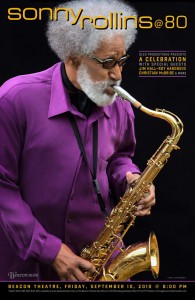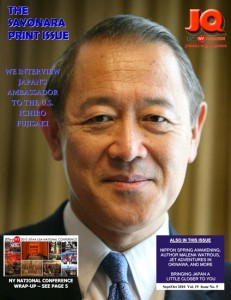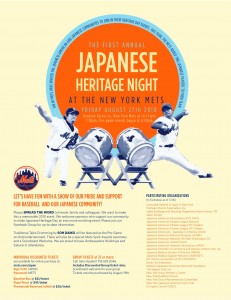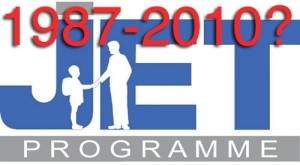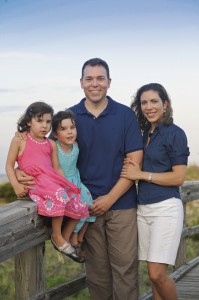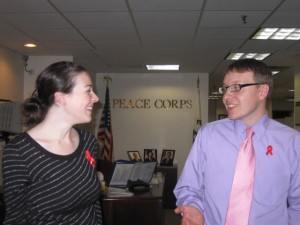Interview with jazz legend Sonny Rollins
By JQ Magazine’s Justin Tedaldi (CIR Kobe-shi, 2001-02) for Examiner.com. Visit his NY Japanese Culture page here to subscribe for free alerts on newly published stories.
Grammy-winning tenor saxophonist Sonny Rollins began his eighth decade of life Tuesday, and will celebrate with a headlining concert at New York’s Beacon Theatre on Sept. 10. I spoke with the man the New York Times recently called “indisputable jazz royalty” about his relationship with Japan and his inimitable philosophy of life.
What are your thoughts about turning 80?
Well, actually, I don’t think too much about it because I’m a pretty busy fellow. It just so happens that I looked at the calendar, and here I am, 80!
After the New York concert, you have three Japanese gigs in October: Sapporo, Tokyo, and Osaka. Can you describe your history with Japan?
Well, I’ve been going to Japan for many years now, I think—since 1963, maybe. And regularly, I go there…the first time I went to Japan, I was taken by the culture, and I was very much looking forward every time I would get a chance to go back. I used to spend a lot of time in these areas—temples, and examining the Zen Buddhist culture, and the various musical instruments that are indigenous to Japan. My wife and I were very fond of going to the Noh theater, and we used to go there every time we got a chance to when we were in Japan. I really love the culture; I love the Buddhist culture, and that’s old Japan.
So, that’s what I always looked for; sought out; yearned for that; when I was away from Japan. It was always, “Yeah, I wish I could get back and smell the country,” you know? The bamboo forests, the sound of the shakuhachi [Japanese flute], and the very peaceful places. The last time I was there—I was there on vacation recently—and I was at Kamakura, it’s among the places that are really so beautifully serene and peaceful. So I really enjoyed that. Of course, I’ve been to Kyoto many, many times, and Nara, and many other parts of the country.
So, I love Japan. As I said, the first time I went there, I got a feeling of great—when I got off the plane, I just felt happy for some reason. And I felt as if I was rediscovering some place that I’d been to in a previous life or something. And I still maintain those feelings about Japan today.
Was there any hesitation about going there the first time regarding American sentiments after the war? Did you have any impressions that were turned around based on the reception you received?
As you know, music is universal…jazz music is a peaceful force, and it’s received all over the world, and people in Japan are very interested in jazz music. They’re really knowledgeable about the music; they’re very interested in the people that play it, and they love it.
Read the complete interview here.
JQ Magazine’s September/October “Sayonara Print Issue” Out Now!
JQ magazine returns with another fall classic! Features include the JETAA USA National Conference wrap-up, a review of JET alum author Malena Watrous‘ new book If You Follow Me, and an exclusive interview with Japan’s Ambassador to the United States Ichiro Fujisaki. Click here to view.
BIG NEWS! This is also JQ‘s final issue in traditional print form. It will return after a brief hiatus as an all-online publication. With no space limitations or monthly deadlines, JET readers from all chapters are encouraged to submit stories, announcements, updates and commentary to help make us a stronger and more unified “national international” publication.
Additional contents below. Thanks to JQ Editor Justin Tedaldi (Kobe-shi CIR, 2001-02) for another sugoi issue. Contact Justin if you’d like to pitch or write a story for future editions.
CONTENTS
- Page 3……..From the Editor, Ambassador of Japan to the United States
- Page 4……..Nippon News Blotter / JETAANY’s Secretary Ties the Knot
- Page 5……..JETAANY Society Page – National Conference Wrap-up by Goshippu Garu
- Page 7……..Ambassador Ichiro Fujisaki: The JQ Interview by Justin Tedaldi
- Page 8……..JoAnn M. Hunter Goes from Broadway to Tokyo by Lyle Sylvander
- Page 9……..Through the Eastern Looking-Glass with Malena Watrous by Sharona Moskowitz
- Page 10……JETlog featuring Stuart Wallace
- Page 11…….Book Corner: Just Enough by David Kowalsky
- Page 11…….Life After the B.O.E. by David Namisato
WIT Life #120: Domestic challenges
WITLife is a periodic series written by professional Writer/Interpreter/Translator Stacy Smith (Kumamoto-ken CIR, 2000-03). She starts her day by watching Fujisankei’s newscast in Japanese, and here she shares some of the interesting tidbits and trends together with her own observations.
Yesterday’s NYT had an article about the rise of Japan’s very own Tea Party. It profiles the rise of the Zaitokukai, or the Citizens Group That Will Not Forgive Special Privileges for Koreans in Japan. In comparison to old-line rightist groups this movement is known as the Net right, as they are organized via the Internet and come together for demonstrations. The article focused on their protest last December at an elementary school for ethnic Koreans. This year they also picketed theaters showing the documentary The Cove, which they perceive to be anti-Japanese. The group is led by a 38-year old man who insists that foreigners have caused Japan to go in the wrong direction (members even harassed some Westerners for wearing Halloween costumes!). The far right writes them off as amateur attention seekers, but nevertheless this is a disturbing trend.
In WSJ coverage this morning, there is discussion of how a majority of Read More
New York Mets Tap JETs for Inaugural Japanese Heritage Night
By JQ Magazine’s Justin Tedaldi (CIR Kobe-shi, 2001-02) for Examiner.com. Visit his NY Japanese Culture page here to subscribe for free alerts on newly published stories.
Move over, Matsui.
The New York Mets will hold its first-ever Japanese Heritage Night at Citi Field on Friday, Aug. 27 against the Houston Astros, with discounted ticket rates available for all family and friends of the Japanese community.
Pre-game entertainment includes taiko drumming by acclaimed troupe Soh Daiko; a traditional Obon dance led by the Japanese Folk Institute of New York featuring dance participants from the Japanese heritage community and friends; the Spirit Award ceremony honoring those in baseball, the military and community service; and the national anthem sung by Japanese Hispanic American Kurt Sanchez Kanazawa.
Donna Tsufura, cofounder of Japanese Americans and Japanese in America (JAJA) and one of the organizers of Friday’s event, has contacted groups like the JET Alumni Association of New York to recruit volunteers to help publicize, assist with and participate in this special night, including the ancestor-honoring Tanko Bushi dance itself in center field. Tsufura said that this helps to fulfill JETAA NY’s mission to increase the understanding and appreciation of Japan and its people in the U.S.
Read the complete story here.
JET Alum Randall David Cook’s ‘Sake with the Haiku Geisha’ Returns to NYC
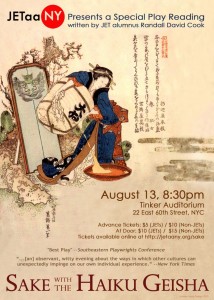 By JQ Magazine’s Justin Tedaldi (CIR Kobe-shi, 2001-02) for Examiner.com. Visit his NY Japanese Culture page here to subscribe for free alerts on newly published stories.
By JQ Magazine’s Justin Tedaldi (CIR Kobe-shi, 2001-02) for Examiner.com. Visit his NY Japanese Culture page here to subscribe for free alerts on newly published stories.
Those who missed the original Off Broadway run of the critically acclaimed play Sake with the Haiku Geisha are in for a treat. As part of its annual national conference, the JET Alumni Association’s New York chapter, with support from the Consulate-General of Japan in New York, will revive the play for a one night only performance on Friday, Aug. 13 at Manhattan’s Tinker Auditorium.
Penned by playwright Randall David Cook and featuring a cast that includes Jun Kim of Kurotama Kikaku Company, the work was debuted by the Gotham Stage Company in 2006 as an outgrowth of Sushi and Scones, an earlier one-act play written by Cook for the UK’s Dawlish Arts Festival and later produced by BBC Radio.
“Ninety percent of the play is based on true stories, and many of the lines were taken verbatim from their subjects,” explained Cook. “The most outrageous things I dared not dream up; they happened.”
Read the full story here.
Singer Hikaru Utada Announces ‘Artistic Activity’ Break
 By JQ Magazine’s Justin Tedaldi (CIR Kobe-shi, 2001-02) for Examiner.com. Visit his NY Japanese Culture page here to subscribe for free alerts on newly published stories.
By JQ Magazine’s Justin Tedaldi (CIR Kobe-shi, 2001-02) for Examiner.com. Visit his NY Japanese Culture page here to subscribe for free alerts on newly published stories.
Singer-songwriter Hikaru Utada is going from exodus to hiatus.
According to a message on her homepage from Aug. 9, Hikki (as she as known to her army of fans worldwide) has wrote that following the release of this fall’s Utada Hikaru Single Collection Vol. 2 album, she will take time off from her musical career effective next year.
The message finds the musician in a reflective mood, recalling the music video from her single “Automatic,” released 12 years ago when the singer was just 15 years old. She commented that since then, “part of my growth has stopped…as a person.” Hikki now intends to focus on “human activity” over “artistic activity” in the next year for an indeterminate period.
Read the full story here.
WIT Life #113: Centenarian crisis
WITLife is a periodic series written by professional Writer/Interpreter/Translator Stacy Smith (Kumamoto-ken CIR, 2000-03). She starts her day by watching Fujisankei’s newscast in Japanese, and here she shares some of the interesting tidbits and trends together with her own observations.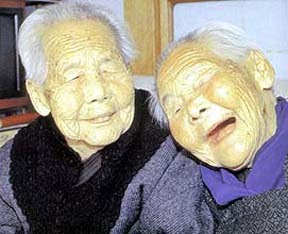
Recent news coming out of Japan has surrounded unsettling discoveries regarding its elderly population. Last week it was revealed that Tokyo’s oldest listed man, who if alive would have been 111 last month, likely died over 30 years ago. According to a report on CNN this morning, currently the whereabouts of about 30 Japanese centenarians are unknown. As discussed in this coverage from Bloomberg, “the disappearance of some of Japan’s oldest citizens is raising concern that some families are bilking the nation’s pension system even as others risk being deprived of payments for the same reason — poor record keeping.” This was a big issue back in 2007 when Read More
Kobayshi Cleared of Charges From Nathan’s Arrest
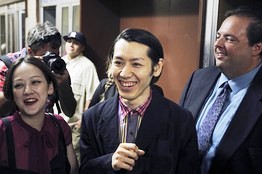
Competitive eater Takeru Kobayashi with interpreter/publicist Maggie James and attorney Mario D. Romano. (Associated Press)
The case, of which its misdemeanors also included charges of obstruction of governmental administration and disorderly conduct, ended with an adjournment in contemplation of dismissal (A.C.D.). This means that if Kobayashi, 32, stays out of trouble for six months, his record will be restored. This is good news for the Nagano native’s New York fans, since he moved to Gotham earlier this year after receiving a 0-1A work visa in February for his “extraordinary ability or achievement.” His visa status should remain unaffected by the court’s decision.
Read the full story here.
Tom Baker interviews “Airbender” cast
Tom Baker (Chiba-ken, 1989-91) is a staff writer for The Daily Yomiuri. As another example of JET ROI, he is one of at least four former JETS to have been on the newspaper’s staff in recent years. He usually writes for DYWeekend, the arts and leisure section. You can follow Tom’s blog at tokyotombaker.wordpress.com.
Recently he interviewed two members of the cast of “The Last Airbender” movie during their promotional visit to Tokyo, asking them for their views on the “racebending” controversy surrounding their film. He also covered an insect show now running at a Tokyo museum, reviewed the manga “Otomen,” and weighed in on a couple of other movies now playing in Japan. Here are some excerpts:
“Last Airbender”
 In the United States, some fans of the anime-style cartoon on which the movie is based have protested against the casting of Jackson Rathbone and Nicola Peltz, who are white, in roles the fans saw as Asian.
In the United States, some fans of the anime-style cartoon on which the movie is based have protested against the casting of Jackson Rathbone and Nicola Peltz, who are white, in roles the fans saw as Asian.
Asked to comment on that, Rathbone said: “I originally was a finalist for Prince Zuko [a Fire Nation role that went to Slumdog Millionaire star Dev Patel]. Almost a year later, I was brought back in for the character of Sokka…I think what they were really looking for was the qualities that people represent, not so much focusing on race…All these characters [in the cartoon] have so many different features, you can’t really say that they are one race…It’s a shame that people really focus on the race thing and they don’t understand that it’s a story for everyone.”
“And there are over 120 different types of people in the film,” Peltz added.
“In terms of a big-budget film, it’s the most ethnically diverse cast there’s ever been,” Rathbone agreed.
Read the rest of the interview here.
“Insects festival”
Open your window on a hot summer day and you may hear a sound that caught the ear of haiku poet Matsuo Basho in the 17th century: the voices of cicadas, seeping into the rocks. Of course, Japan today is a lot more urbanized than it was in Basho’s time, and cicadas are more likely to sing against a background of asphalt and cement. Yet year after year, the buzzing bugs never fail to show up, even in the heart of Tokyo.
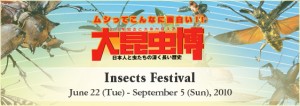 Visitors to Insects Festival, an exhibition now running at the Edo-Tokyo Museum in Ryogoku, Tokyo, are reminded of such persistence right away with a display of six-legged critters that live in three different Tokyo zones: mountains, fields and downtown areas.
Visitors to Insects Festival, an exhibition now running at the Edo-Tokyo Museum in Ryogoku, Tokyo, are reminded of such persistence right away with a display of six-legged critters that live in three different Tokyo zones: mountains, fields and downtown areas.
While city-dwellers often resent sharing space with the likes of cockroaches and ants, the emphasis of this show is on seasonal outdoor insects whose diverse shapes, bright colors and occasional songs actually enhance city life…
Read the rest of the article here, or visit the exhibition’s site here.
“Otomen”
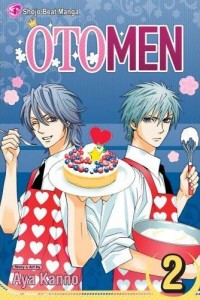 Anyone writing a graduate thesis on the presentation of gender in Japanese pop culture will find abundant material in the manga series Otomen. Readers looking for laughs will also find what they seek in Otomen, but rather less abundantly.
Anyone writing a graduate thesis on the presentation of gender in Japanese pop culture will find abundant material in the manga series Otomen. Readers looking for laughs will also find what they seek in Otomen, but rather less abundantly.
The main characters are a trio of high school students, with the focus on Asuka (a boy who has a name more common for girls), who is in love with Ryo (a girl who has a name more common for boys). Their would-be romance is complicated by the constant presence of their friend Juta, who tries to play cupid, but is more often a third wheel.
Asuka is the captain of the school kendo team, and is admired by everyone as a “real man.” But he is secretly an “otomen,” a boy who is into girly things, such as cute stuffed animals and delicate pastries. He is at least as skilled at cooking and sewing as he is at sports, but he keeps that side of himself hidden. Ryo is Asuka’s mirror image in that she has been raised by her socially inept father to follow in his footsteps as a martial arts champion, but she strives to put up a feminine front at school. Juta has a secret, too, as he is actually a best-selling manga artist who is using the couple as a model for his stories…
Also playing…
You can read Tom’s review of “Inception” here, and his review of “Zombieland” here.
JET ROI: JET Program Alums, Allies Mount Petition Campaign
By JQ Magazine’s Justin Tedaldi (CIR Kobe-shi, 2001-02) for Examiner.com. Visit his NY Japanese Culture page here to subscribe for free alerts on newly published stories.
Since 1987, the Japan Exchange and Teaching (JET) Program has hired over 50,000 native English speakers to work at Japanese public schools, enriching ties between nations. Now, Tokyo’s new ruling political party has JET in its crosshairs in the wake of its effort to slash public spending to reduce its ballooning public debt. In a hearing last May, an 11-person panel of the Democratic Party of Japan ruled unanimously for a comprehensive examination of the program to decide whether it should be scaled back or cut entirely.
JET, an initiative of the Japanese government and run by three of its national ministries, has an annual budget of over $400 million. It was launched with the intentions of increasing grassroots internationalization in Japan, primarily through introducing foreigners to Japanese youth as schoolteachers across the country contracted for a minimum of one year. While the program does not require applicants to be licensed teachers (successful candidates team teach with the host school’s own native Japanese English instructor), they are expected to have an interest in Japan and a desire to integrate themselves in their new communities as cultural ambassadors.
Read the rest of the article here.
JQ Magazine’s July/August “Hot Button Issue” Out Now!
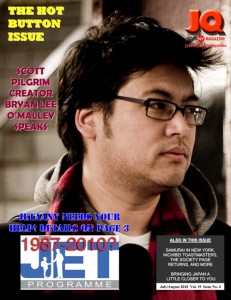 JQ knows you’re going to see Scott Pilgrim vs. the World, the summer’s coolest comic book movie, so why not get to know the the guy who started it all, cartoonist Bryan Lee O’Malley? Their new “Hot Button” issue features an exclusive interview with Bryan, a recap of the new Samurai in New York museum exhibition, and the return of the JETAANY Society Page, plus more! Click here to view.
JQ knows you’re going to see Scott Pilgrim vs. the World, the summer’s coolest comic book movie, so why not get to know the the guy who started it all, cartoonist Bryan Lee O’Malley? Their new “Hot Button” issue features an exclusive interview with Bryan, a recap of the new Samurai in New York museum exhibition, and the return of the JETAANY Society Page, plus more! Click here to view.
Additional contents below. Thanks to JQ Editor Justin Tedaldi (Kobe-shi CIR, 2001-02) for another sugoi issue. Contact Justin if you’d like to pitch or write a story for the next issue.
CONTENTS
- Page 3……..From the Editor, Japan Local Government Center Executive Director
- Page 4……..Nippon News Blotter / Welcome Suzuki-san
- Page 5……..JETAANY Society Page by Goshippu Garu
- Page 6……..JETlog featuring Byron Nagy
- Page 6……..Samurai in New York Exhibition by Mark Brandstetter
- Page 7……..Bryan Lee O’Malley: The JQ Interview by Justin Tedaldi
- Page 8……..Nihonjin in New York featuring Noriko Hino by Stacy Smith
- Page 9……..Book Corner: Nintendo Magic by David Kowalsky
- Page 10……Nichibei Toastmasters by Pam Kavalam
- Page 11……The Funny Page
- Page 11……The Heiz Rocks On by Hugh Prysten
JET ROI: Top Ten “Best of JQ” Articles That Support Our Cause
Wondering how JET alums give back to the community and make new connections with Japan after their work on the program is over? JQ Magazine Editor Justin Tedaldi (Kobe-shi CIR, 2001-02) has compiled a list of ten relevant articles from the past two years that exemplify the dedication of our members.
2010 May/June – Bruce Feiler interview (an author who’s probably the biggest “JET celebrity” out there. Wrote his first book about his JET experiences) by Justin Tedaldi
2010 January/February – Aaron Woolfolk interview (JET alum, first African American to direct a feature film in Japan) by Lyle Sylvander
2010 January/February – Peace Corps profile (talks with those who joined Peace Corps after the positive experience they had on JET) by Marea Pariser
2009 Fall – International Visitor Leadership Program interpreting (shows how JETs can become invaluable interpreters to continue grassroots internationalization at home) by Stacy Smith
2008 Summer – Ambassador Nishimiya interview (boosts visibility of new Japanese officials to our readers; demonstrates strong relationships between JETAA chapters and local government) by Anne Koller
2009 Spring – Hikaru Utada interview (probably the longest English-language interview with Utada out there. It was even translated into Japanese by a resourceful fan) by Justin Tedaldi
2009 Spring – JETAANY Author Showcase (names four notable JET alum authors and also stands as a unique event organized by JETAANY) by Gina Anderson and Justin Tedaldi
2009 Spring – President Sakurai of Japan Society interview (this piece examines JET’s relationship with non-profit cultural centers and is included in Japan Society media kits) by Justin Tedaldi
2008 Fall – Anthony Bianchi interview (JET done good in Japan) by Michael Glazer
2008 Summer – George Rose interview (JET done good at home) by Stacy Smith
Comments are welcome. Spread the word!
By Justin Tedaldi, Editor (Kobe-shi CIR, 2001-02) for JQ Magazine. Portions of this interview were originally published on Examiner.com.
Award-winning bestselling author, journalist, and—in his own words—“professional traveler” Bruce Feiler (Tochigi-ken, 1987-88) has been a writing books for nearly 20 years, the most recent of which focused on social issues and religion. Bruce’s new book, The Council of Dads: My Daughters, My Illness, and the Men Who Could Be Me, was inspired by his diagnosis with cancer two years ago. Faced with an uncertain future and concerned about his family, he asked six of his peers to form a “Council of Dads” to help guide his young daughters through their lives. JQ spoke with Feiler about the start of his writing career, which began with 1991’s Learning to Bow, an account of his time living in Japan as an English teacher on the inaugural year of the JET Program, as well as his thoughts about the program today.
You’re now cancer-free. When did you receive this prognosis, and what was your treatment like?
I was first diagnosed in July 2008, and I had osteosarcoma, which is so rare that only one hundred adults a year get it. Twenty years ago they would have cut off my leg and hoped, since there was a fifteen percent survival rate. They determined that one cocktail of chemo could be effective, and I had that. I basically had four months of chemo, a 15-hour surgery to rebuild my leg, and then four more months of chemo. So, I’ve technically been cancer-free since my surgery when they cut the tumor out of my femur. I’ve been cancer-free now for about 15 months. I’m full of hope walking forward.
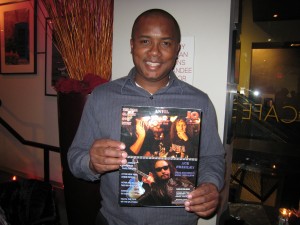
JET Filmmaker/JQ subscriber Aaron Woolfolk at the New York premiere of his film ‘The Harimaya Bridge,’ December 2009
By Lyle Sylvander (Yokohama-shi, 2001-02) for JQ Magazine
Most JETs enjoy telling tales about the cities they lived in. But it’s a select few who take the extra step of making movies that actually take place in them. JETAA Southern California’s Aaron Woolfolk (Kochi-ken, 1992-93) is the writer and director of The Harimaya Bridge, which received a theatrical release in Japan last year and premiered in New York’s Upper West Side in December as part of the African Disapora Film Festival.
The film stars Ben Guillory as Daniel, an American man who travels from San Francisco to Kochi after his estranged son—who works as an assistant English teacher—Mickey (Victor Grant) dies in a traffic accident. There, Daniel’s own prejudices spark rows with his Japanese hosts and daughter-in-law Noriko (Saki Takaoka) as he discovers secrets his son left behind. The film will receive a wider release in the U.S. for spring 2010, and JQ talked with Aaron about the making of the film.
How did you get involved with JET?
During my senior year in college, I ran into a couple of friends who were on their way to pick up an application for the JET Program. I had nothing to do when I saw them, so I tagged along. I had never heard of the program before, but it definitely intrigued me. I had always wanted to experience another culture firsthand, and thought the best way to do that would be to live in that culture, rather than merely visiting it for a limited time.
By Marea Pariser (Kagoshima-ken, 2003-04) for JQ Magazine
What comes to mind when you think of the Peace Corps? Is it the image of young, daring humanitarians performing HIV/AIDS work across Africa? Or how about the ambitious environmentalist who flocks to third-world Latin America to build aqueducts in the locals’ backyards? Sure, we all know the stereotype—adventurous, somewhat-experienced travelers willing to spend two years out in the bush roughing it with the locals as a result of their passion to see the world and underlying desire to help others.
Perhaps we’ve thought about the opportunity for ourselves. And it’s likely that we all know at least one person who’s a current or returned Peace Corps volunteer. What probably doesn’t come to mind, though, regarding this nearly 50-year-old program—founded in 1961 by the Kennedy administration—is the image of native English speakers flying abroad to teach English as a second language to locals in over 70 countries where the Peace Corps has presence.
Sound familiar? It should.

